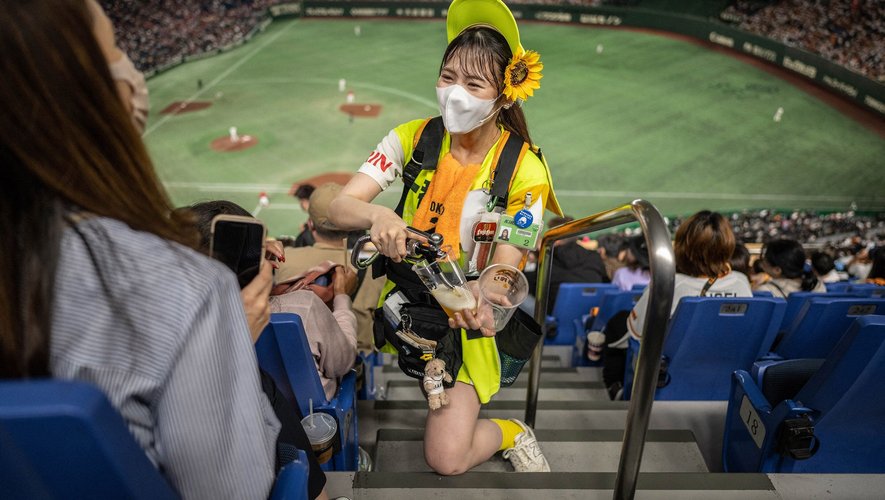(AFP) – They roam the bleachers, beer taps on their backs: in Japan, these street vendors in baseball stadiums represent a tradition that is still very popular, even if their working conditions can be questionable.
Called “uriko” (“the saleswomen”), these young women relentlessly go up and down the stairs in the middle of the bays, slipping a few kind words to their customers while filling their cups with a beer gun.
They are easy to spot with their neon uniforms, always consisting of a miniskirt or shorts. Some also wear knee pads to protect themselves from injuries and grime, as they often have to kneel when serving a beer – so as not to obstruct the view of the supporters.
Despite everything, Honoka Hagiwara, a 22-year-old saleswoman in the Tokyo Dome stadium, explains to AFP that she likes her job, even seeing a “glamorous” side to it.
“I’ve been doing this job for a little over a year and I’ve gotten used to it,” she says of having to carry a keg of beer weighing up to 15 kilos for three hours straight. .
The young woman admits that it was “physically very hard” at the beginning. But she says she enjoys helping fans have fun, and says the job gives her “confidence”.
– Pit stops –
Competition between these street vendors is fierce because they are paid on commission.
Mariko Matsumoto, a 25-year-old “uriko”, says she is “always thinking” about her sales figures. “We pay attention to the sales of others and we think of our own, trying to sell more than the day before”.
The hundred Tokyo Dome vendors serve around 20,000 cups per game night on average.
They change their barrels ten to twelve times during their service, with a speed and efficiency that has nothing to envy to pit stops in Formula 1.
Barely time to drink a glass of water or cold tea standing while assistants replace his barrel on his back, and the “uriko” sets off again in search of thirsty customers.
Few men today do this demanding job, whereas they were in the majority until the 1980s.
There are only female vendors at the Tokyo Dome, but a spokeswoman for the site assures AFP that the organizers are not opposed to the idea of hiring male vendors. Simply, “there are 100 times more women who apply than men”.
– “Creepy” –
The archipelago has had its own #MeToo movement, although less vigorous than in other countries, and in recent years Japanese women have questioned many local traditions, such as heels at the office or having to serve tea at their male colleagues.
However, the tradition of “urikos” is almost non-debatable, nor is that of cheerleaders performing somersaults on the field between playing times.
Part of the explanation probably lies in the fact that the atmosphere in baseball stadiums in Japan is generally peaceful, with a disciplined, mixed and family audience. And security guards intervene if drunk spectators cross the line.
Like her colleague Honoka Hagiwara, Mariko Matsumoto explains that she enjoys interacting with fans: she has bonded with some regulars, even receiving gifts from them from time to time.
Ms Matsumoto thinks it’s important to keep smiling even when it’s hard: ‘I like watching baseball games myself, and when I see a salesman smiling, it makes me want to buy a drink’ .
But the experience of this profession is not so positive for everyone. In 2019, a former “uriko” called her “creepy” on a blog site hosted by the Asahi newspaper.
“It didn’t take me long to realize that I wasn’t just selling beers and snacks – I was selling myself,” wrote this former “uriko” who complained about customers wanting to take her picture or give her away. their business cards.

